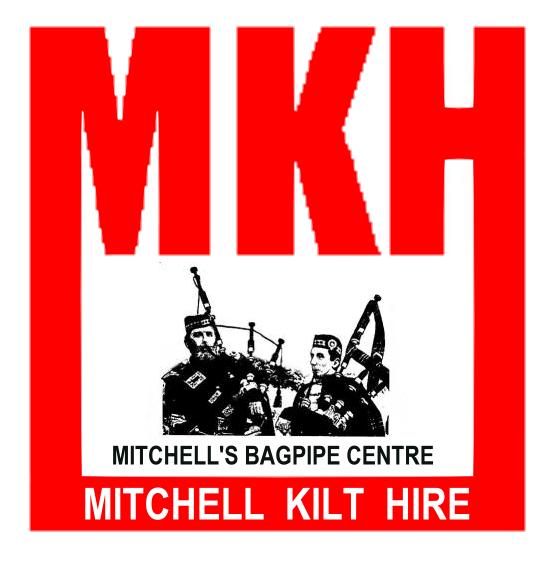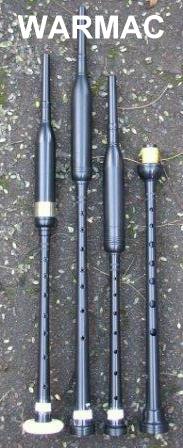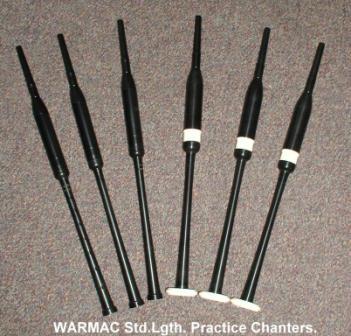About Practice Chanters.
A practice chanter is a means to an end. All pipers learn on a practice chanter the
fundamentals and techniques that enable them to play the highland bagpipes. It's not
a true musical instrument but it can sound musical if tuned properly. As far as I
am ware of, highland bagpipers are the only musicial performers that learn on one
instrument to play another. The practice chanter is vital for the learning process
and all life-time learning and practice of new tunes. I am aware that a highland piper
in NZ made and introduced to the Dudy piping fraternity within the descendants of the
NZ Bohemian Engerlander settlers, some practice chanters for
them to use for learning the Bohemian Dudy. This was novel and as far as I know
been very successful. Possibly it is a concept tthat has been passed back to the
Engerlander
piping community the their Bohemian/German/Czech homeland.
African Blackwood (ABW) and plastic (polypenco / delrin) practice chanters are
always in stock
at Mitchell's Bagpipe centre.
Some manufacturers now combine both ABW and polypenco on some of their practice chanter
models. eg. ABW for the chanter part
and plastic for the mouthpiece and reed chamber. This helps preserve the now limited
reserves of genuine African Blackwood. Many so called ABW practice chanters and bagpipes
from foreign sources, are acually wood that is dyed black to imitate African Blackwood
and so
lacks consistent tonal qualities from one shipment to another. A reason items from non-
traditional sources are not stocked. Polypenco / Delrin is an engineering grade plastic
with the same density and specific gravity as ABW so the product is often used for all
sorts of musical instruments as well as in many fittings used in the North Sea Oil
installations. Polypenco produces a very consistent product.
Practice chanters get wet inside if you're doing the proper amount of practice. To take a
practice chanter apart grip the reed chamber in one hand and the ball at the top of the
chanter section in the other. Do not grip on the chanter itself. See parts diagram below.
Grip the ball firmly and pull or ease this away from the reed chamber. Be careful not to
damage the reed when removing or refitting the reed chamber. Often the reeds get
quite abused when the practice chanter is opened to dry out the bore and the reed itself.
Never pull the blades when removing the reed. Never push the blades when re-inserting the reed.
The reed should always be handled by gripping over the reed staple (the tube of copper or brass
in the centre of the binding) and always as close to the reed seat (hemp end of the reed) as
possible. Some reeds use electricians shrink wrap to hold the blades to the staple. Others use
waxed hemp or even the same material as dental floss. Whatever it is, the rule of gripping over
the staple and not on the blades is very important. You can apply shrink wrap over the hemp
if that sort of thing appeals - just be very careful not to warm up the plastic blades. They
can collapse rendering the reed useless.
If the reed you're using sounds flat, or is too noisy, try using a small orthodontists rubber
band doubled around the blades as a bridle. These rubber bands are used on dental braces so
your nearest friendly Orthodontist may prove useful for other than fixing up the alignment of
your teeth or your children's teeth. You simply move the bridle up or down the blades to get
the sound volume/pitch you like. Practice chanters supplied from us have a reed with a bridle
fitted already.
Another tip is to clean the reed seat throat, and the finger holes with a pipe-cleaner. This
helps remove a build up of dirt or gunk and keep the tone of your practice chanter clear and
it helps dry out the moisture from accumulated condensation. Special grommets can be used
around the reed staple area to absorb moisture. A rolled tissue can do the same trick. If your
practice chanter isn't getting wet - you aren't doing enough practice! When drying the reed
after removing it from the reed seat - please don't squeeze it to push the moisture from
between the blades into a tissue. Gently place the end of the blades against a tissue and
blow through the staple end. Don't use a hair drier, a fan heater or leave the reed in a hot
sunny location. The blades are only plastic and they will collapse making the reed useless.
If handled with care plastic practice chanter reeds can last for years.
The polypenco models of practice chanter seems to accumulate moisture more readily than
the ABW models. However they all get wet so drying out the bores and the reed chamber is
a regular task. Tissues do the job well but periodically wash the internals with luke warm
soapy water to which drop of a mild disinfectant has been added. It is possible to get very
fine bottle brushes to get into the bores, but as mentioned before, pipe cleaners are good for
the very narrow throat in the reed seat and down into the bore behind the hi-A and down to
the E hole.
ABW practice chanters can benefit from a very sparing applied lick of almond oil (obtainable
from your local chemist or pharmacy) once every 6 months to a year.
Oh and one other thing. When you've finished your practice, or even just interrupted it to
answer the phone or go to dinner. Please put it down somewhere safe. Not on the sofa or seat
where it will be sat on. Or on a table where it will roll off, or on the carpet where someone
will stand on it. You might even do that yourself! Nor on the top of a heater, on a sunny
window sill, or on the dash board of your car. Murphy declares those places are perfect for
mishaps to occur. He also likes pets that chew up reeds or chanters, and babies or toddlers
just love pulling things apart and chewing on the soft plastic they find inside. Another reed
gone west might be the minimum damage, the worst might be a totally crushed and broken practice
chanter.
And one more thing. Toddlers like blowing and dribbling down a practice chanter - just like dad
or mum, or older brother or sister, but be aware if they trip over while wandering around and
the practice chanter is in their mouth, or near their face, they could easily end up with some
serious injury. So a firm rule should be, none of that for the toddler.
What length Practice Chanter?
Childs size: These are really for children with small hands and usually by age 10-12 they will
outgrow this size.
Adult or Standard size: These have been around for hundreds of years and are still perfectly
good. They're actually better for stowing away in a travel bag than the newcomer 'Longspan size'.
Longspan size: The chanter section of these approximates the length of a full pipe chanter and the holes are much closer
with finger hole spacing to match the bagpipe pipe chanter. However they are still not exactly the same.
These also need taking apart when stowing unless you only stow them away in your pipe-box.
Some folk use these as a small-pipe chanter. The ABW versions can be about as expensive as a
full bagpipe chanter. They're fashionable if being in the 'trendy' crowd is important to you and some
Pipe-Majors do recommend them. MacCrimmon didn't have one as they only appeared in the late 20th century, so the choice of standard or longspan
length is entirely up to you.
(Did you ask who MacCrimmon was?)
Parts of a Practice Chanter.

|
__1. Mouthpiece (usually detachable on ABW models, often not on polypenco models) fits onto 2.
__2. Reed chamber section. Fits over (6) and protects the reed.
__3. Reed. (other styles are shown, including an ancient cane practice chanter reed).
__4. Chanter section.
__5. Sole. Often absent on polypenco models.
__....... Once made from ivory, now imitation ivory or metal, horn, silver etc.
__6. Hemped pin. The yellow linen hemp thread can be waxed. The reed seat is in the centre of this pin.
__7. This is the ball that must be gripped when taking apart a practice chanter.
__....... Never grip on the chanter (4) and twist or bend it - unless you want to break it.
__8. Ferrule, usually of imitation ivory, nickel silver, silver, s/steel. Often not on polypenco models.
__....... Originally was to stop wood of reed chamber from cracking and splitting.
|
This page is here to inform and indicate the range of bagpipe practice chanters available.
You can visit the manufacturers sites for options but a good range is held here in NZ.
If the particular model you want isn't here, it can be obtained for you.
All are from Scotland, Nn. Ireland or Canada. Pakistani models are NOT sold here.
NZ $Prices are NOT available online on this web-site.
Request prices by
e-mail
Dunbar Practice Chanters.
(On page link)
.......
Dunbar Polypenco PCs (Off site link)
.......
Dunbar (ABW) African Blackwood PCs (Off site link)
MacPherson Practice chanters.
......Hand crafted by Douglas MacPherson. These are for the discerning
learner or piper.
Shepherd Practice Chanters.
Wallace Practice chanters.
Warmac practice chanters.
Sales are made by personal contact. Call in map (by appointment), phone (07) 827 6906
or e-mail
me and we start from there.
Payments by plastic are not possible, so this page does not shove
you into a "shopping or sales cart" mode.
Purchases can be made using cash, personal cheque or direct bank
deposit.
| Select the category for your inquiry
by row, and then click on the cell, or simply scroll down
the page. |
 Bagpipe ~ Sales & Service
Bagpipe ~ Sales & Service 










 .....
.....
 .....
.....

 .....
.....
